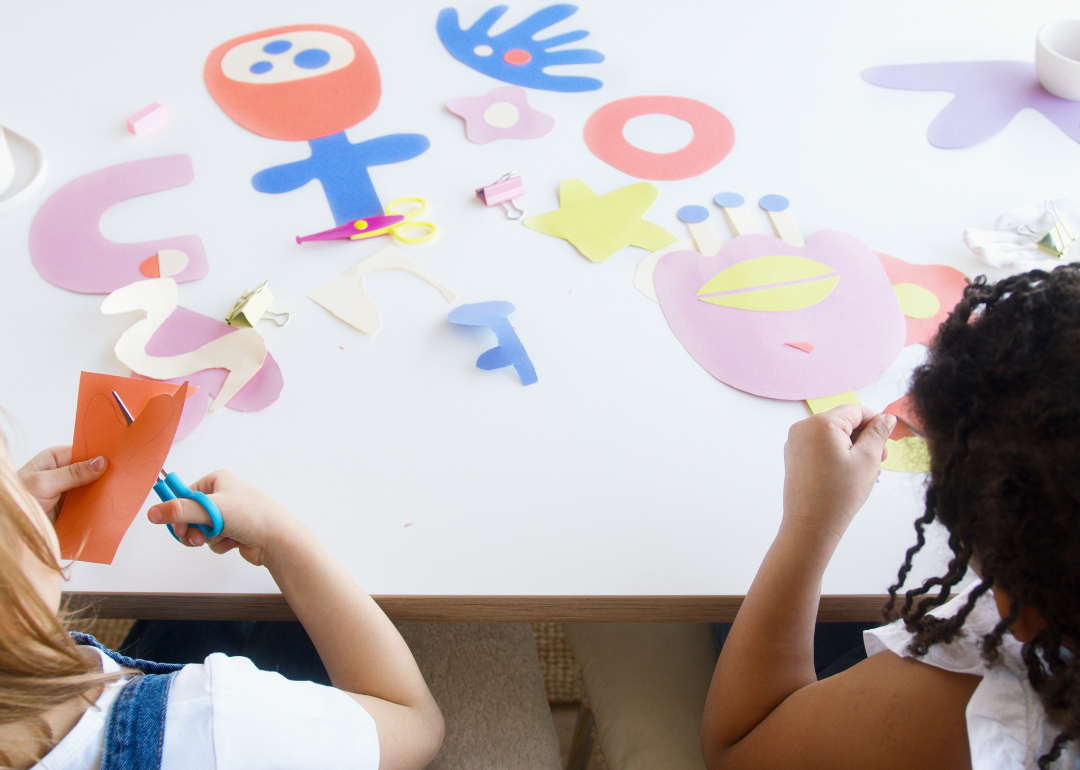
What research shows about the benefits of pre-K
What research shows about the benefits of pre-K
The first five years of a child's life are critically important to physical, social, emotional, and intellectual development. Decades of research has shown how preschool can aid in solidifying these important cognitive foundations—and so much more. Although prekindergarten is not currently a universal system in the U.S. and has no standardized data, numerous long-term studies have been conducted in school systems around the country, providing rich examples of the possibilities and benefits of early childhood education.
Across various studies, pre-K attendance has been linked to beneficial outcomes for the individual students, their families, and the overall economy. In Boston, a 20-year study found that pre-K attendance was correlated with increased high school graduation and college matriculation compared to children who did not attend preschool. In Tulsa, Oklahoma, pre-K attendance improved math literacy and honors enrollment. In Washington D.C. a 10% increase in the maternal workforce was attributed to the city's two-year universal pre-K system. According to a cost benefit study, Georgia expects a return of $5 in savings for every $1 invested in their universal pre-K.
In the longest longitudinal study of its kind called the Perry Preschool Project, researcher and Nobel laureate James Heckman was among the first to show how preschool attendance could break the poverty cycle. More than 50 years later, Heckman released new data showing that the benefits of preschool attendance can span generations, with positive outcomes seen in the children of his initial program participants.
Just 34% of 4-year-olds and 6% of 3-year-olds were enrolled in state-funded pre-K programs nationwide during the 2018-19 school year. Early childhood education in the U.S. is unevenly funded from state to state. Its cost is often prohibitive for low-to-middle-income families where state-funded or subsidized options aren't available, and programs varied widely in their quality standards, which address teacher qualifications, class sizes, and programming requirements. In several states, including Idaho, Montana, New Hampshire, South Dakota, Indiana, and Wyoming, no state-funded pre-K programs are available.
When you consider how big of an impact early education can have on a child's trajectory and their community, it's not surprising that universal pre-K has largely bipartisan support. The Biden administration's American Families Plan includes a provision for universal preschool for all children ages 3 to 4. Under this plan, every child is guaranteed a seat at a high-quality, state-funded (free to families) preschool if they want it.
Stacker reviewed data from numerous longitudinal studies conducted around the country analyzing the impact of pre-K enrollment on lifelong outcomes. Read on to learn more about the benefits of pre-K.

In Boston, pre-K enrollees were more likely to graduate high school
Economists Christopher R. Walters, Guthrie Gray-Lobe, and Parag A. Pathak from the National Bureau of Economic Research used data from 4,000 pre-K applicants in Boston between 1997 and 2003 to analyze the outcomes of preschool enrollment. According to the study, 70% of students enrolled in a Boston pre-K program graduated from high school compared to the 64% graduation rate among students who were not enrolled.

In Boston, pre-K enrollment increased test-taking rate
Although researchers saw no statistically significant impact on standardized test scores, they did discover that children enrolled in a Boston pre-K program were more likely, by 8.5 percentage points, to actually show up for and take standardized tests like the SATs compared to students who did not enroll in pre-K.

In Boston, boys were more likely to benefit from pre-K enrollment
The greatest impact of pre-K enrollment in Boston was realized among boys. Boys took the SATs, graduated from high school, and matriculated at four-year colleges at a greater rate than girls.

In Boston, pre-K enrollees were more likely to matriculate at college
One of the most important takeaways from Boston’s study is educational attainment—achieving higher levels of schooling. Because students who attended a public pre-K in Boston are more likely to take the SATs and more likely to graduate from high school on time, they’re also more likely to matriculate at a two- or four-year college on time compared to their peers who were not offered pre-K enrollment.

In Boston, pre-K enrollment resulted in fewer disciplinary interventions
Students enrolled in pre-K experienced lower rates of suspension, absenteeism, and juvenile incarceration compared to their non-enrolled peers. This is consistent with the results of an earlier study by James Heckman in Ypsilanti, Michigan, which found that people not enrolled in the Perry Preschool Project averaged twice the number of juvenile and criminal arrests compared to program participants.
You may also like: The best streaming services in 2021

In D.C., universal pre-K allowed mothers to join/reenter the workforce
In 2009, Washington D.C. started offering two-year, full-day universal pre-K. This gave parents, particularly mothers, the opportunity to increase working hours and take-home pay that may have otherwise been spent on childcare or private pre-K programs. The city’s maternal labor force increased by 10% thanks to the time and financial freedom of universal pre-K.

In Ypsilanti, pre-K enrollment resulted in fewer special education services
The Perry Preschool Project out of Ypsilanti, Michigan is one of the most widely cited studies supporting the benefits of pre-K enrollment, particularly for disadvantaged populations. The project tracked outcomes of 64 bBack 3-and 4-year-olds from low-income families who attended pre-K, and 64 Black children from low-income families who did not, with check-ins at ages 27 and 40.
The cohort that attended pre-K spent an average of 1.3 fewer years receiving special education services. Some advocates point to universal pre-K as more cost effective than remediation services like special education later in life. The program estimates education savings of more than $7,000 among pre-K attendees.

In Ypsilanti, pre-K attendance resulted in a 44% higher high school graduation rate
Students who participated in the Perry Preschool Project were 44% more likely to graduate from high school compared to the control group of non-enrolled students. These findings are consistent among other pre-K outcome studies, including those conducted in Boston and Tulsa.

In Ypsilanti, pre-K attendees earned more as adults
By age 40, program participants’ median monthly income was 42% higher than those who did not attend pre-K. Program participants also had a noticeably higher rate of employment. Advocates point to outcomes like this as evidence that early education programs can help break poverty cycles.

In Ypsilanti, pre-K attendees received less government assistance
By age 40, 59% of program participants received some form of government assistance such as welfare or food stamps compared to 80% of people in the control group. This is another example of how pre-K can be an effective way of reducing government spending.

In Ypsilanti, pre-K attendees engaged in less criminal activity
By age 40, Pre-K program participants were 46% less likely to have been incarcerated and 33% less likely to have been arrested for violent crimes throughout their lifetime. The estimated crime savings for program participants is just over $171,000.

In Ypsilanti, positive pre-K outcomes impact the second generation
New data released in 2019 revealed that, compared to the children of the control group, the children of the Perry Preschool Project participants were less likely to be suspended, less likely to be arrested or experience addiction, and more like to be employed full time.
You may also like: The best streaming services for sports in 2021

In Tulsa, pre-K attendance boosted math performance
Gormley also reported that pre-K attendance was linked to higher math scores on standardized tests and an increased likelihood that students enrolled in algebra 1 earlier than their peers. By the time they graduate from high school, pre-K attendees will be more likely to have taken an advanced math course compared to peers who were not enrolled in early childhood education.

In Tulsa, pre-K attendance reduces grade retention
Researcher and Georgetown University Professor Bill Gormley tracked the outcomes of pre-K attendees in Tulsa, Oklahoma into 7th grade and released his findings in 2017. According to his research, pre-K attendees were 26% less likely to repeat a grade.

Nationwide, pre-K programs can yield a 13% return on investment
High quality pre-K programs are more than an impactful educational stepping stone. They're an important investment in the country's economy. While it may vary from state to state, research suggests that these programs may yield a 13% return on investment, nationwide.
You may also like: The best streaming services for football in 2021



